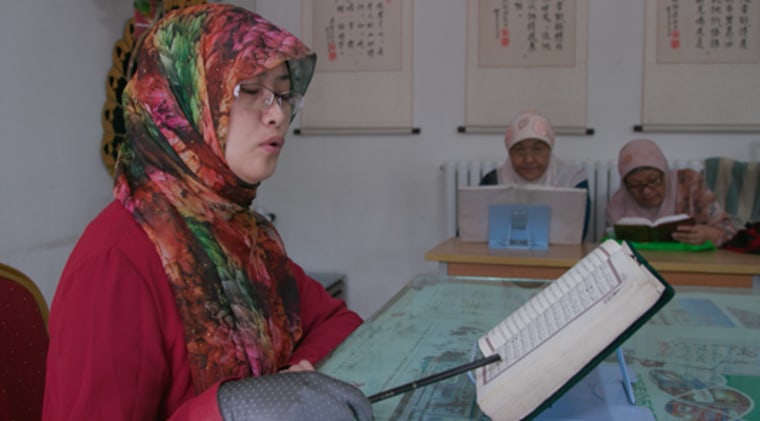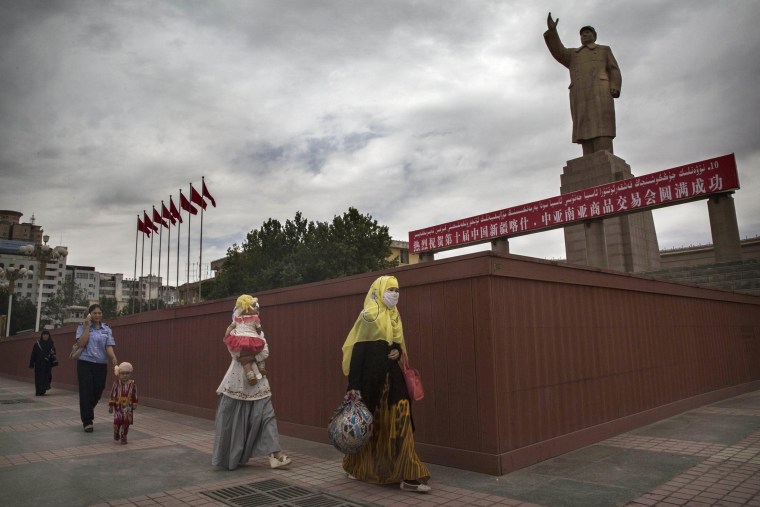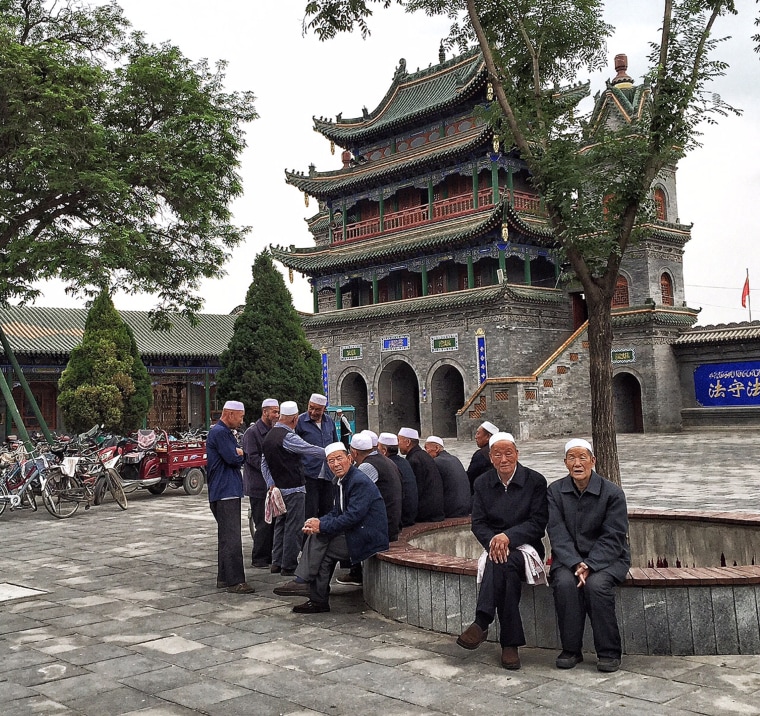YINCHUAN, China — This imam wears heels — and a gold-flecked headscarf.
Ma Lijuan is one of the faces of state-backed Islam in officially atheist Communist China.
Female imams like her are unique to China's Hui, a Muslim minority group — as are their women-only mosques.
Ma hails from the Ningxia Hui Autonomous Region, a sparsely populated province straddling an arid plateau on the Yellow River basin in north-central China.
“Here, [religion] is very normal for us,” said Ma, 33. "Our constitution grants us the freedom of religious belief, and we are thankful to live here."

Ma, who is married with two boys, helps lead a congregation of hundreds at the Nanguan Mosque in the provincial capital of Yinchuan. The mosque — with its onion-shaped domes and treed courtyard — dates to the 1900s but was refurbished in the 1980s.
"As a teacher, spreading Islamic truth is my duty," Ma told NBC News. "When we are educating a Muslim woman we are also educating a family."
Every morning Ma teaches Quran classes to dozens of mostly middle-aged and older women who repeat her chants in Arabic. She speaks in a gentle yet confident voice, and her infectious laugh punctuates conversations.
Ethnically Chinese Hui Muslims speak Mandarin and in recent decades have nurtured a coexistence with the Communist Party. The party has in return rewarded the community — which traces its roots to 10th-century Arab traders who married Chinese women — with the latitude and support to establish mosques, religious schools and museums.
However, the two haven't always had such a harmonious relationship.
During the Cultural Revolution, religious communities throughout China were persecuted, and the Hui were no exception. After the country emerged from the tumult in 1976, the Hui reinstated the practice of their faith.
China's constitution provides for freedom of religion, but within very strict limits. Five "recognized religions" — including Christianity and Islam — are permitted to worship at state-approved sites. Proselytizing in public is illegal and unregistered groups, such as Tibetan Buddhists or Falun Gong, routinely encounter problems.
Not all of China’s 23 million Muslims, a legacy of traders who centuries ago ventured from the Middle East along the Silk Road, practice as freely as the Hui do.
Turkic-speaking Uighurs have increasingly chafed at large-scale immigration of China’s dominant Han Chinese. Ethnic tensions fueled violence that Chinese authorities point to as justification for religious restrictions and repressive tactics.

This year the government barred Uighur Muslim civil servants, students and children in the far western region of Xinjiang from fasting for the Muslim holy month of Ramadan.
The rest of the year, burqas, long beards and calls to prayer over loudspeakers are banned throughout Xinjiang. People under the age of 18 are not allowed to enter mosques at all.
The government’s unease with Islam intensified with the rise of Islamic extremism and as groups like ISIS recruited followers in China. Late last year, a digital recording of an ISIS chant in Mandarin calling on Muslims to “wake up” and “take up weapons to fight” was posted online.
“It would be naïve to say China does not face a problem with jihadi-style extremism,” said James Leibold, an expert on China’s ethnic minorities at Australia's LaTrobe University. “But I don’t think that problem is nearly on the scale that the government perceives it to be. They have overblown it, which is dangerous and counter-productive because it whips up anti-Islamic fear and suspicion.”
Gallery: Uighurs in Kashgar: China's Muslims Try To Preserve Traditions
Aware of how its crackdown in Xinjiang might affect its image in the Middle East, China recently issued a white paper on religion that declared "no Xinjiang citizen has been punished because of his or her rightful religious belief."
Beijing, meanwhile, has invested heavily in Yinchuan and the surrounding area.
The makeover includes a new airport terminal to handle what local officials hope will accommodate a flood of Muslim tourists from the Middle East as China seeks to boost its image in and trade with the Arab world. The government is also promoting Hui-made products and real estate developments as part of its ambitious “One Belt, One Road” strategy to revitalize trade along the ancient Silk Road.

Even street signs are being translated to Arabic.
“Unlike some other minorities, Hui people follow the leadership of the government,” said singer Ma Shouyun. "The state supports our religion very much.”
Because of all that the Hui are allowed to practice in relative peace.
On a recent evening as the call to prayer echoed across a courtyard, dozens of men adjusted their white caps under the shade of a locust tree and filed into Najiahu Mosque. It is a ritual practiced five times a day by Muslims all over the world.
But even in Yinchuan amidst state support most Hui remain conscious of their delicate position. When the conversation with Ma, the singer, shifted from Hui culture to Islam, a nearby shopkeeper interrupted him.
“No questions about religion,” she warned him, sparking a tense discussion with bystanders about the risk of irritating officials.
Few of them noticed the singer take off his TV microphone, straighten his cap and quietly walk away.
